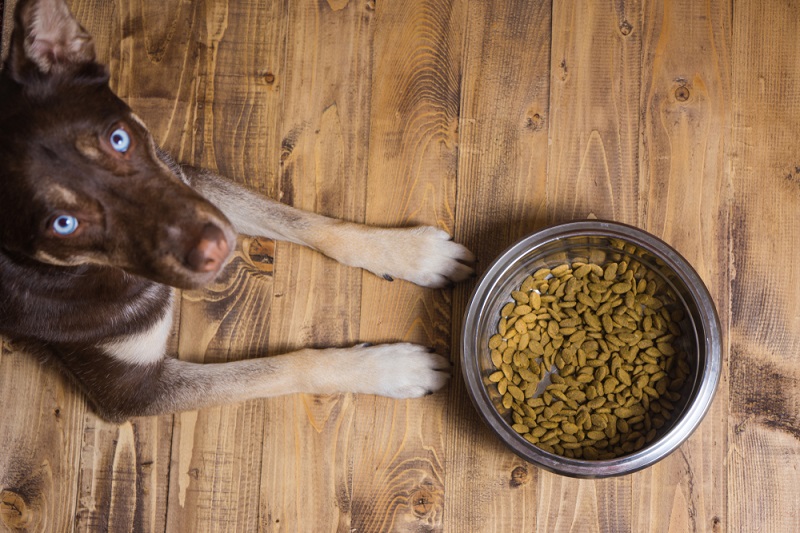The debate around grain-free dog food is enough to confuse any dog parent out there. If you feed your dog meals that consist of bones, raw meat, and some fruits and vegetables thrown in, you could consider it as a grain-free diet.
Pet food brands, however, have a different definition of what a grain-free diet entails. Whenever a particular dog food is created without the usage of rice, corn, wheat, or other types of grains, it is defined as grain-free food.

Since dogs need to derive their energy in some other way, grain-free diets usually resort to carbohydrates in various forms, such as pea flour, lentils, and potatoes. This type of food is normally opted for when a dog has grain allergy or a low tolerance for regular dog food with grains.
So, should you think about grain-free food for your pet? Is it safe and healthy? We’re here to provide you with all the information you need.
Why Grain-Free Dog Food is Bad for Pets
The reason grain-free dog food gained popularity is because pet parents started to believe that digesting grains is difficult for their pets.
Companies advertise grain-free food in a manner that suggests that dogs should be fed like their ancestors or like wolves, but the evolutionary logic reveals that unlike wolves, dogs can actually digest the starch found in grains.
Here are some things you should know about grain-free dog food before making a decision:
Poor Quality Proteins and Starches
Most of the grain-free dog food contains low quality proteins such as soy. It is difficult for dogs to digest soy as it is extremely processed and can also cause hormonal issues.
Even the plant-based proteins and legumes used in grain-free meals such as peas, lentils, and beans are a low source of protein.
If you believe that grain-free products will provide your dog with more meat protein, then think again, because the meat they contain is highly processed and difficult for dogs to digest.
The starches present in grain-free food are just cheaper ingredients and are not meant to enhance the nutritional value of the meal. With your dog consuming poor quality starches, they can suffer from inflammation.
Additionally, starches of low quality are high in calories and can lead to obesity, skin problems, and also digestion-related disorders.
Genetically Modified Organisms (GMOs)
GMOs can lower the nutritional goodness of food items, making them more toxic and allergy-inducing. The plants that are genetically modified are often done so in order to make them virus-resistant or insect-resistant.
The crops that are usually genetically modified include potatoes, rice, soy, corn, peas, soy, legumes, and beets.
GMOs are common in grain-free food, and studies have indicated that they can cause liver damage, cancer, kidney damage, cognitive problems, digestive imbalances, disruption to the endocrine system, damage to the immune system, and also to the reproductive parts and pancreas.
Linked to Heart Disease
Although commercial brands would like you to believe that grain-free dog food is healthy, the Food and Drug Administration (FDA) discovered that the dogs who were made to follow this diet were contracting heart issues.
The FDA released a statement in 2018 saying that they are conducting an investigation to see what links heart problems in dogs to grain-free meals. They also mentioned that grain-free dog food contains ingredients not found in regular dog food, such as lentils, potatoes, and peas.
The researchers participating in this investigation found that many of the dogs who were fed grain-free food had developed DCM or dilated cardiomyopathy, which is a very serious heart condition among dogs.
DCM causes a dog’s heart muscles to get weak, with the heart chambers widening and becoming larger, due to which the heart cannot pump blood efficiently, causing them to collapse or develop heart failure or coughing.
Conclusion
When thinking about grain-free dog food, do remember that it doesn’t mean that the meal will be free from fat, sugar, and carbs. In fact, you could end up feeding your dig with more calories and reducing the quantity of nutrients in the process.
Veterinarians themselves have said that food allergies are a rarity among dogs, and the allergy-causing substances aren’t usually grains.
Therefore, choose nutritionally rich and well-balanced meals for your dog and consult your vet instead of getting sucked in by fad diets and myths.
Meta description: What is grain-free dog food? Is it healthy and safe for your pet? Keep reading to find out.
